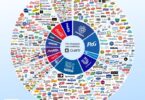The following report is from Study Finds:
Nearly 300 toxic chemicals may be lurking in common items in your home right now, a new study warns. Researchers from the Silent Spring Institute in Massachusetts say exposure to these chemicals may increase a person’s risk of developing breast cancer.
The study finds these products include everything from processed foods, to lipstick and mascara, pesticides, and even furniture. The ingredients, called endocrine disrupting inhibitors, fuel hormones that trigger the disease.
The connection between estrogen and progesterone and breast cancer is well established.
So, we should be extremely cautious about chemicals in products that increase levels of these hormones in the body.
Co-author Dr. Ruthann Rudel, a toxicologist at Silent Spring Institute, in a media release.
Every day, people encounter a variety of synthetic chemicals through the products they use or the food they eat. The team notes that such chemicals also make their way into contaminated drinking water. For many of these toxins, their impact on human health is still unknown.
How Are These Chemicals Affecting Breast Tissue?
The new study reveals that these chemicals make cells in breast tissue produce more estrogen or progesterone. The study in Environmental Health Perspectives combed through data on more than 2,000 chemicals examined by the U.S. Environmental Protection Agency (EPA)’s ToxCast program.
In laboratory experiments on cells, 296 raised levels of progesterone or estradiol, a form of estrogen. Over 70% of these substances increased both. Researchers find many of the chemicals are in additives in processed foods, such as packaged meat, pies, sweets, and snack foods.
Personal hair care products such as hair dye also make the list, along with other consumer goods. Study authors warn that appliances include harmful flame retardants in their building materials, which can leak out into the environment.
Almost two decades ago, the Women’s Health Initiative study discovered a link between hormone replacement therapy and breast cancer. Women stopped taking the drugs and cases went down.
Not surprisingly, one of the most common therapies for treating breast cancer is a class of drugs called aromatase inhibitors that lower levels of estrogen in the body, depriving breast cancer cells of the hormones they need to grow.
Dr. Ruthann Rudel
A Wake Up Call For The Manufacturing Industry?
The researchers don’t yet know how the chemicals are causing cells to produce more hormones. The may be acting as aromatase activators, for instance, which would lead to higher levels of estrogen.
What we do know is that women are exposed to multiple chemicals from multiple sources on a daily basis, and that these exposures add up.
Co-author Dr. Bethsaida Cardona
The goal of ToxCast is to improve the ability of scientists to predict whether a chemical will be harmful or not. It uses automated chemical screening technologies to expose living cells to chemicals and then examine the different biological changes they cause. The researchers hope the study will be a wake up call for regulators and manufacturers.
The team notes that current safety tests in animals fail to look at changes in hormone levels in mammary glands in response to chemical exposure. These tests also don’t use high throughput testing in cells to identify chemicals that trigger estrogen or progesterone.
This study shows that a number of chemicals currently in use have the ability to manipulate hormones known to adversely affect breast cancer risk.
Especially concerning is the number of chemicals that alter progesterone, the potential bad actor in hormone replacement therapy. Chemicals that elevate progesterone levels in the breast should be minimized.
Study editor Dr. Sue Fenton, a breast health expert at the National Institute of Environmental Health Sciences.
Protecting Children From Harmful Toxins
The study authors are calling for improvements in testing to help identify potential breast carcinogens before they end up in products. They also suggest finding ways to reduce people’s exposures, particularly during critical periods of development. This includes puberty and pregnancy, when the breast undergoes important changes.
The project is part of Silent Spring’s Safer Chemicals Program which is developing new cost-effective ways of screening toxins’ effects on the breast. The knowledge will help government agencies regulate chemicals more effectively and assist companies in developing safer products.
The American Cancer Society estimates that 281,550 women will receive a breast cancer diagnosis this year. Experts say over 43,000 Americans will die from the disease in 2021.
AUTHOR COMMENTARY
[20] My son, attend to my words; incline thine ear unto my sayings. [21] Let them not depart from thine eyes; keep them in the midst of thine heart. [22] For they are life unto those that find them, and health to all their flesh. [23] Keep thy heart with all diligence; for out of it are the issues of life. Proverbs 4:20-23
If you want to take control of your health and avoid these chemicals, especially if you are a woman, you will have to take action into your own hands. No one in the government and medical juggernauts will do a thing to stop this or regulate it. And why should they, when they are purposefully inhibiting cancer, which makes the medical mafia billions of dollars annually?
The WinePress noted a study in June that showed evidence that increasing your intake of omega-3 fatty acids from fish will eradicate cancer cells. Additionally, sustained and long term intermittent fasting will actually cause the body to destroy cancer cells and repair itself. But intermittent fasting is never-ever promoted by any mainstream outlet because there is no money in telling people: DON’T EAT.
Moreover, last week The WinePress reported that an increase of fermented foods and beverages will also cure cancer in the body.
Study Finds High Blood Pressure Medications Make The Issue Worse
Study Shows That Small Amounts Of Junk Food Can Stunt Growth In Children And Weaken Their Bones
New Study Finds That Artificial Sweeteners Damage Organs. Sweetener Institute Disagrees
Study Finds New Chemicals And Pollutants In Our Bodies
[7] Who goeth a warfare any time at his own charges? who planteth a vineyard, and eateth not of the fruit thereof? or who feedeth a flock, and eateth not of the milk of the flock? [8] Say I these things as a man? or saith not the law the same also? [9] For it is written in the law of Moses, Thou shalt not muzzle the mouth of the ox that treadeth out the corn. Doth God take care for oxen? [10] Or saith he it altogether for our sakes? For our sakes, no doubt, this is written: that he that ploweth should plow in hope; and that he that thresheth in hope should be partaker of his hope. (1 Corinthians 9:7-10).
The WinePress needs your support! If God has laid it on your heart to want to contribute, please prayerfully consider donating to this ministry. If you cannot gift a monetary donation, then please donate your fervent prayers to keep this ministry going! Thank you and may God bless you.








[…] Study Reveals That Hundreds Of Chemicals In Household … […]